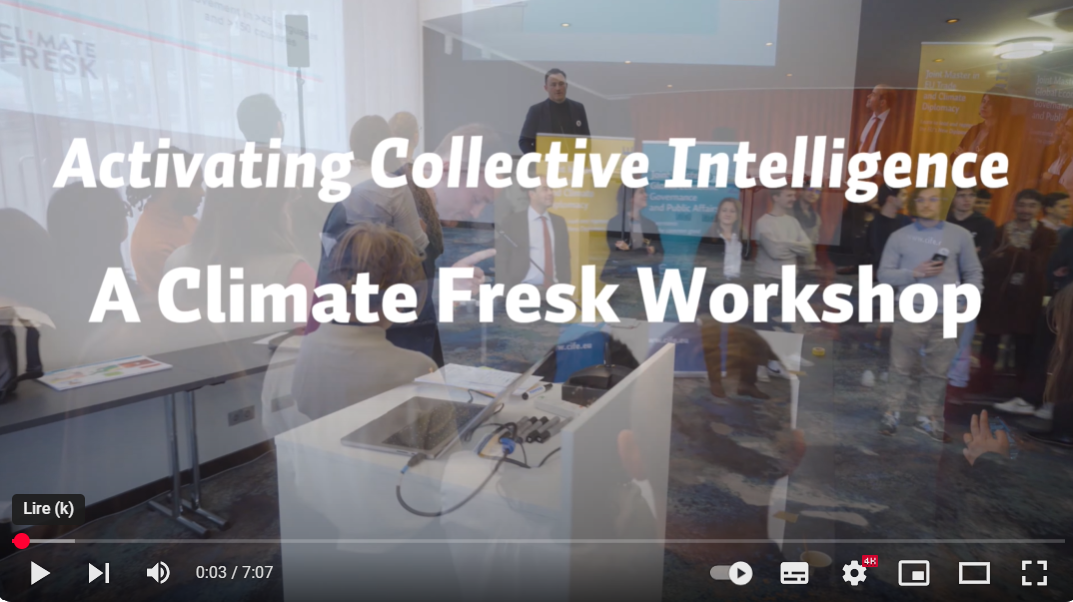
Spotlight on Research from the Joint Master Programme
This blog is dedicated to current topics in the realm of global economic and cultural governance and climate diplomacy. It features contributions by experts, students and alumni of the Joint Master in Global Economic Governance and Public Affairs (GEGPA), EU Trade and Climate Diplomacy (EUDIPLO), and European Cultural Governance (EUCULTURE) organised by CIFE in partnership with the LUISS School of Government.
The blog offers students, lecturers and partners the opportunity to present their research on the topics of economic governance and climate diplomacy. Furthermore, it provides the general public with a glance into some of the research activities conducted at CIFE.
Towards a Global Governance Barometer. Michel-Henry Bouchet and Alexandre Landi
Although the concept of good governance has become the obligatory reference in academic round tables and meetings of international bodies or rating agencies, there is no consensus on its definition, content or measurement. We define governance as the robustness of institutions which help transforms economic growth into sustained and inclusive development. Clearly, fighting corruption is a crucial ingredient of governance, together with accountability, transparency and regulatory quality. To measure the level of governance in one hundred developing countries, a new composite indicator has been built, based on specific sub-indices of institutional quality, government efficiency and corruption. Its added value stems from an “expert assessment” that is based on seasoned country risk analysts, including professors and trained alumni from CIFE’s and Luiss’s Joint Master in Global Economic Governance and Policy Affairs.
Read or download the paper

Michel-Henry Bouchet

Alexandre Landi
The Three Amigos Unite: An Inside Look at the Summit of North American Leaders, Simone Lucatello
In January 2023, the “Three Amigos” (USA, Canada and Mexico) gathered in Mexico City to hold the Summit of the North American Leaders (SNAL), convening in one of the most important diplomatic events of the year. President Biden, Prime Minister Trudeau and President López Obrador met in a three-day meetings and conference to discuss mainly the strengthening of important long-term cooperation to make North America a more economically and competitive area, prepared to face global challenges. Main topics included the future relations with China and other partners around the world. It was also the opportunity to talk about security, migration, climate change and possible future threats for the region.
Simone Lucatello is a Full-time Researcher at Instituto Mora, a public research centre based in Mexico City, Mexico.
Read or download a brief of the summit

Simone Lucatello
Here It Goes Again! The IMF’s Call for Urgent Debt Reduction requires a Governance Framework, Michel-Henry Bouchet
The IMF keeps preaching generous debt reduction across the board without clear governance conditionality, hence generating moral hazard that boils down to providing blank checks for corrupt elites. For many of the eligible countries, debt problems stem from bad governance, including a combustible mix of corruption, unabated capital flight, bad prioritization of spending, and poorly designed fiscal and monetary policies. Without a strict governance enforcement framework, external debt cancellation will only keep encouraging institutionalized kleptocracy. The international civil servants should shift their priorities toward funding closely monitored development projects, together with on the ground NGOs, to make sure that aid-related official financing directly contributes to improving local populations’ well-being.”
Read or download the paper

Michel-Henry Bouchet
Activating Collective Intelligence | Video of a Climate Fresk Workshop
In February 2024, the students of CIFE's Joint Masters had the opportunity to take part in a “Climate Fresk” afternoon prompting participants to take constructive action to tackle climate change. Watch the inspiring video of the event and what the students and facilitators say about their experience.
Watch the video
About Loss and Damage: Addressing Climate Change |Interview with Dr Paul Desanker, UNFCCC
In this interview, Paul Desanker, Manager at UNFCCC, explains the UNFCCC's work to prevent and mitigate the consequences of human interference with the climate system. He elucidates how the often-used terms "adaptation" and "mitigation" are connected and stresses the importance of young people in influencing and shaping future climate policies.
Watch the video
Policy Making at the Global Level - The Role of the United Nations | Interview with Dr Richard Byron-Cox, UNCCD
"Compromise is not weakness, but the internal grace of reason." Learning about Policy Making at the global level from a seasoned negotiator at the United Nations' UNCCD.Interview with Richard Byron-Cox on the art of making necessary compromise and the concept of "One Health".
Read the interview
Advancing Sustainability Studies | Interview with Solène Droy, IASS
"The sustainability conundrum can be seen as “wicked problem” if you consider it at a global level and from a complex systems perspective."
Solène Droy is Head of the Research Group "International dialogues for pathways to sustainable futures" at the nstitute for Advanced Sustainability Studies (IASS), Germany.
Read the interview
Philanthropy and Sustainable Development
"The strength of philanthropy is its ability to be ubiquitous and versatile."
Interview with Anne-Cathrine Frogg Spadola, Marc Salzmann and Laurent Douek from Swiss Philanthropy on the foundation's work and its engagement for a committed philanthropy among private and institutional donors, with a purpose of public utility. On the occasion of their workshop "Philanthropy and Sustainable Development" with students of the Joint Masters in Global Economic Governance & Public Affairs and EU Trade & Climate Diplomacy on 27 and 28 June 2022 in Nice.
Read the interview
CIFExpress | An Outlook on the Upcoming Debt Crises by Michel-Henry Bouchet
Despite waves of debt and financial crises since the 1970s, this time, it’s different! In his outlook on the upcoming debt crises, Michel-Henry Bouchet analyses the current, highly critical economic situation in which developing countries are faced with converging shockwaves including shrinking economic growth and investment flows, coupled with higher rates of interest - in a context of geopolitical turmoil that increases energy, fertilizer, and food prices.
Watch the video

Video of the Climate Fresk


RIchard Byron-Cox

Solène Droy

Anne-Cathrine Frogg Spadola

Laurent Douek
Student Papers & Podcasts
This category features the best blog articles from the Joint Master students submitted as a deliverable for the completion of their workshops in Nice.
Embracing the Wisdom of Ages: How Indigenous Values Offer Fresh Perspectives on Climate Action
By Laure-Anne Menke, Laura Mazzoni, Dana Ross, Mostafa Ajamay - June 2023
Read or download the paper
Why the EU Should Include Circular Economy Products in Its Ecodesign Regulation
By Francesco Bellati - June 2023
Read or download the paper
NEWS from the GEGPA & EUDIPLO Network
In October 2022, Björn Fondén and Arne Ellerbeck, recent graduates of GEGPA and EUDIPLO have founded the Institute for Climate Policy Solutions (ICPS). the world's first youth-led global think-tank aiming to provide sustainable and concrete policy solutions to the climate crisis.
Their mission statement: At the ICPS, we believe there is a need to bridge the gap between the growing movement of young people in the streets, and the people in power that are shaping our future. There is a need for us, as young people, to level up our activism, to bring it into the meeting rooms, to not just be a fire in the streets but also a trusted, professional partner in shaping the concrete climate policy solutions we so desperately need - because we cannot trust the policymakers of yesterday to design the transformative policy changes needed to secure our future.
Read more about ICPS and how you can contribute.
|